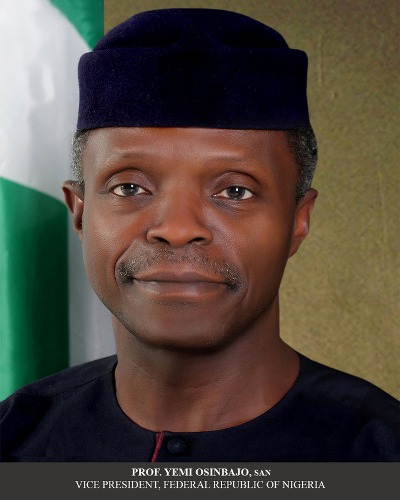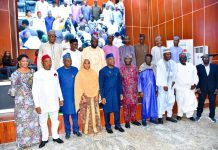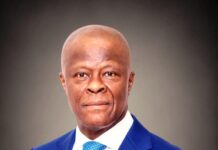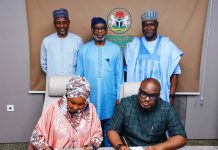ABUJA (VP’s Office’ Report)- The Vice President, Prof. Yemi Osinbajo SAN, while addressing a gathering of business men, women and investors has reiterated federal government’s commitment to deliver, on the ease of doing business.
He made the declaration at the instance of the Presidential Policy Dialogue, organised by the Lagos Chamber of Commerce and Industry, at the Eko Hotel and Suites, Victoria Island, in Lagos recently.
The Vice President who spoke as a special guest and keynote speaker, said that President Buhari has approved the establishment of Presidential Council on Ease of Doing Business, to improve soft infrastructure of rules and processes; and to remove unnecessary red-tapes and other impediments, thereby making it easier to register businesses, obtain land titles, clear goods from the ports, obtain a business visa and pay taxes, among other things.
While commending the President of the LCCI, Nike Akande (Dr. Mrs), he said that Lagos Chamber of Commerce and Industry is perhaps the most significant Private Sector Group, giving kudos for the laudable initiative of the dialogue.
Giving content to the dialogue, Prof. Osinbajo gave a brief analysis of the state of the Nation since the Buhari regime came into office till the present time. In his words, “Nigeria within the past 15/20 months has gone through probably, its most challenging period in recent history”.
He listed some challenges of the Federal Government and the Nation saying, the immediate problem that was encountered was a sharp decline in fuel prices and production and, the lack of savings to cushion the impact.“This crisis affected almost all facets of the economy, as reflected in declining external reserves, scarcity of foreign exchange, fuel supply shortages. Also including derelict infrastructure, especially in the extensive power shortages, low investment in oil and gas sector, huge debts owed to construction industries, the last one paid was about N400 billion; post-mounting salary arrears both in the States and Local Government levels, increasing un-employment and poverty levels, failing business confidence, insecurity especially in the North East and, furthermore the Nation suffered from a viscous cycle of corruption, evidenced by huge leakages, fiscal misdemeanours and indiscipline”. He observed that, all these things have been compounded in various ways, due to continued weakness in the overall global economy and inherent structural deficiencies, in domestic economy.
Prof. Osinbajo further stated that the Federal Government undertook some specific interventions towards tackling these problems, which were prioritised and reflected in various ways in the 2016 Budget and its Strategic Implementation Plan. “For instance, towards safeguarding jobs and preventing further increase in un-employment, Federal Government gave priority attention to assisting States and Local Governments, to enable them pay salary arrears of their workers, which were owed several months in arrears”.
According to him, downstream petroleum sector was deregulated and this has had significant increase in the availability of PMS throughout the country. He further stated that the recent introduction of a flexible exchange regime, has helped to ease pressure on external reserve noting that, though the immediate effect is depreciation of the Naira and some consequences for inflation, Government is confident of the stability of the foreign exchange market and restoration of public confidence, with the implementation of CBN’s policy.
Analysing further, the Vice President stated that there will be an increase in the supply of foreign exchange, especially due to inward investment and increased receipts from non-oil exports. He informed that, Federal Government has pledged to keep capital spending at 30%, since it is investment that grows an economy he noted. The main sectors for which funds have been released include, power, works and housing; defence, transportation and agriculture.
He emphasize that Buhari’s government has indeed achieved a change in public financial management, adding that this has had a consequential effect on saving jobs as well as money, “ghost workers” eliminated at Federal level is a job saved.
According to him, the Treasury Single Account, which brought transparency into inflows and outflows of Government monies, the on-going implementation of the Integrated Payroll and Personnel Information System (IPPIS), which saved Government N8 billion and creation of Efficiency Unit, which is projected to save N14 billion in 2016 fiscal year are all part of the policy instruments employed to effect the change he listed.
In addition he said, “A great effort has been made to improve non-oil revenues for instance, FIRS proposed bringing an additional 700,000 companies into the tax net as compared to the targeted 500,000 set at the beginning of the year. It has also implemented VAT-COLLECT for auto tracking and remittance of VAT and has increased collaboration with State Government in tax collection”.
In a similar vein Osinbajo intimated, that Customs have undertaken substantial revision of incentives, control and enforcement measures. He stated further that agriculture is Government’s priority towards deepening the diversification efforts, listing food security, a reduction in the financial burden and pressure on foreign exchange as obvious gains. Informing that the Federal Ministry of Agriculture has published a roadmap titled ‘The Green Alternative’ he said that, it is the Administration’s Strategy for unlocking growth in the agricultural sector.
While encouraging investors, Prof. Osinbajo said, “We realise that the private sector has been the engine of growth in successful economies; this is why we continue to support and encourage massive investments by private investors and key employers of labour”.
He enlightened that government intends to emulate what has already been achieved, in turning limestone to cement, as regarding other solid minerals for instance he said, “Our recent settlement on Ajaokuta holds out promise for reviving our iron and steel industry in a similar manner”.
He assured that, in addition to benefiting from an improved skill mix in the labour market, the private sector will be a major beneficiary of infrastructural investments that government is making in power, roads, rail and airports. Adding, efforts are underway to continue to diversify sources of energy, including hydro, biomass, coal and solar among others.
Concluding, Prof. Osinbajo affirmed Government’s commitment to ensure security, fight corruption and improve economy, enumerating Government’s immediate tasks to achieve as follows:
*Reduce Fiscal and forex imbalances; *Boost dollar liquidity; *Curb Inflation; *lower interest rate and ensure lending to real sector; *Increase FDIs and FPIs by sustaining enabling policies; encourage PPPs and other collaborative engagements in the private sector; *deepen diversification; *Create jobs directly and indirectly and; *Reduce poverty.






